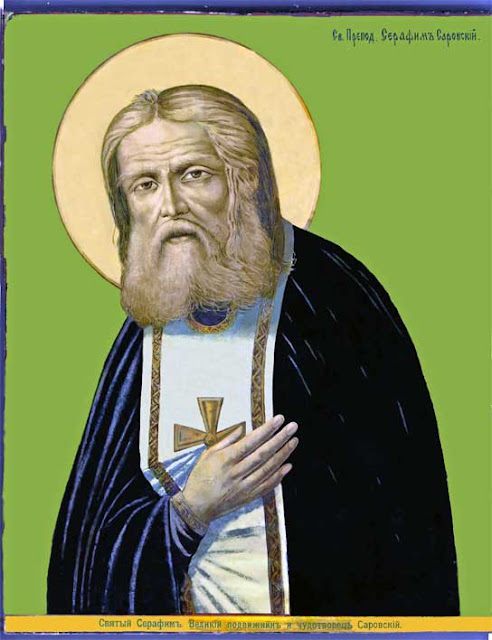St. Seraphim of Sarov on the way to the near desert.
‘Andrey Rublev’ Museum, Moscow.
Beginning of 20 century.
by St. John of Shanghai and San Francisco
"In mid-summer they will sing for Pascha" – they used to say once in Sarov. 70 years have passed since the death of the one for whom these words were uttered, and on July 19, 1903 all of Russia echoed with praise songs glorifying God and His pleaser. Indeed, all of Russia was exulted then, as on a day of Holy Pascha, even more.
There followed terrible days for Russia, but the memory of Rev. Seraphim did not die or weaken. Russian people come to him in flows and praise him both within the tormented Motherland and in all imaginable ends of the world, where they have been dispersed. Other nations, too, began to get acquainted with the life of St. Seraphim; his live has been translated into different languages, causing not just admiration but also desire of many to make use in their lives of the lessons given us by the life of St. Seraphim. So, despite all the changes taking place in the world – the memory of St. Seraphim is not only not waning, but it is remaining a burning light, shining brighter and brighter for all humanity.
In earthly lifetime it was very much the same. Cities went down, kingdoms were restored; Napoleon along with 12 nations went on Russia and then shamefaced left it; Moscow burned down and rose again from the ashes; Decembrists staged an uprising and were judged; and St. Seraphim it seemed was never touched by these developments. He was entirely busy with achieving "the sole thing needed"; he worked on "his spiritual growth". "Selfish, self-contained" "ignoramus who was not interested in anything other than what concerned him personally" – this is what many thinkers would say about him, not wishing to see even the slightest use of the exploits of self-perfection. But here – monk Seraphim dies. It would seem that now the image of this elder – escaping so persistently the world – would be absolutely erased from human memory. Instead a whole pilgrimage started towards his grave, in all parts of Russia those resorting to his intercession got help, consolation and edification, and his worshipping started spreading among other nations, too.
What is the St. Seraphim’s strength? What is his exploit? He sought to fulfill the commandment of Christ: "Be ye therefore perfect, even as your Father which is in heaven is perfect." [Matt. 5:48]; he worked hard to restore in himself the pristine image of man corrupted later by sin. St. Seraphim reached his goal: he defeated sin and became a saint {Reverend}; he truly made of himself a likeness to God. We cannot see the invisible God. But God grants us to see Him in His likeness, in His saints {pleasers}. And here – one of these likenesses became St. Seraphim. In him we see the human nature restored, freed from the slavery to sin. He is the incarnated personification of the victory of the eternal over the transient, of holiness over sin, of good over evil. St. Seraphim with his example calls on all to follow the road indicated by Christ. He calls on us to fight against sin and our shortcomings, being a beacon and light for all who seek salvation. St. Seraphim calls on us to seek the highest good, the spiritual fruit, for which Apostle Paul said: "the fruit of the Spirit is love, joy, peace, longsuffering, gentleness, goodness, faith, meekness, temperance" [Gal. 5:22-23]. But in order to achieve this one should crucify "the flesh with the affections and lusts" [Gal. 5:24].
Hard is the road to the heavenly kingdom, for sin has taken possession over human nature and has ruined it. Each of us has personal sins. There are also community {social} sins, which all the nation has sinned in. And so, the whole Russian people has sinned in this that it abandoned the pious life and customs of its ancestors, and started to accept and look for foreign to it non-Orthodox, it believed the calumny spread about the One Anointed by God, and allowed first the breaking of the crown, and then the killing of the entire family of its pious King, the one first who bowed to St. Seraphim’ relics. St. Seraphim called all to repentance and to straightening of life – both personal and social. Even though this road is hard, God's pleaser will help them follow it. St. Seraphim is the beacon and the light of this road, he is also an intercessor.
Through the prayers of Thy Reverend, the father of ours Seraphim, O Lord, grant us repentance and victory over sin - to us, sinners, and lead us into Thy heavenly kingdom.
Amen.
Serbia, 1928


No comments:
Post a Comment
To comment you MUST be
a Google account user